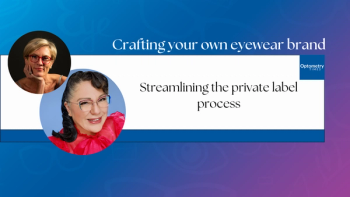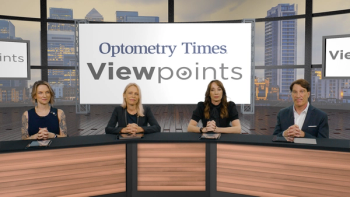
VEW 2024: Spreading the word about GA management advancements
Mark Dunbar, OD, FAAO, details a presentation he gave alongside Rishi Singh, MD, on geographic atrophy at Vision Expo West 2024.
Over the last few years, 2 FDA approved treatment options have become available on the market for geographic atrophy (GA). This has spurred an excitement in the optometric community, according to Mark Dunbar, OD, FAAO. He details this excitement in his talk, "Advances in the Diagnosis and Management of Geographic Atrophy," which he gave alongside Rishi Singh, MD, at this year's Vision Expo West.
Video Transcript:
Editor's note: The below transcript has been lightly edited for clarity.
Jordana Joy:
Hi everyone. I'm here today with Dr. Mark Dunbar, director of optometric services at Bascom Palmer Eye Institute. He will be detailing some of the presentations that he'll be giving at this year's Vision Expo West. So welcome. It's a pleasure to have you here today.
Mark Dunbar, OD, FAAO:
It's great to be here, Jordana, I'm excited. Don't get a chance to do this very often, so should be fun.
Joy:
Awesome. It's a pleasure to have you for sure. So first, could you give an overview of what you went over in a couple of your presentations?
Dunbar:
Sure. I'm doing a course with Rishi Singh. Rishi is a world famous retinal specialist out of the Cleveland Clinic, and we are doing a talk on geographic atrophy. It's a one hour talk. It's early in the morning – 7:15 – but what could be better at 7:15 than a talk on GA? As you know, we went from really no treatments for this disease a couple of years ago to now we've got 2 FDA approved treatments. And it's important for optometry, because we are on the front lines of macular degeneration, and particularly GA. And one of my mantras is we just really haven't been looking for it. So I think because of the attention and these type of programs, I think we spent a lot of time talking about GA. How do we identify it, and again, you know, what is the best patient to refer to a retinal specialist? And again, how good are these treatments? And there's some really exciting data showing that if we can keep these patients going on a treatment by year 2 to year 3, we're really able to see a pretty significant difference in slowing the growth rate of geographic atrophy. So I think it'll be a great talk. Rishi is, if you haven't heard him, he's a great lecturer. He is world renowned in ophthalmology, and really, I think, one of the top retinal specialists, almost, in the world. So it's always a privilege for me to get a chance to share a podium with Rishi. And again, I think we're going to have a great time, a great discussion, talking about geographic atrophy.
Joy:
Absolutely, yeah. Looking forward to it, for sure. So you had mentioned those FDA approvals that just recently come through. How does that really change the landscape of treating and diagnosing AMD and GA?
Dunbar:
Well, you know, I think the diagnosis of AMD has never been in question. Again, as optometrists on the front lines, I think we see it every single day. The problem is, when we talk about GA, it's not like it exists in a vacuum. Oftentimes patients will have a lot going on in GA and our focus has been really categorizing or staging the dry form of the disease, and then the question: have they converted from dry to wet? We haven't been looking for GA. And you know, when we think of it, I think collectively, all of us, the picture that we conjure in our mind is that large lesion that's already threatening central fixation or coming close to and I think we recognize GA probably starts small. It starts outside the fovea. And again, if we can identify those patients earlier, before it is starting to affect vision, and then get those patients to a retinal specialist, I think the goal is preserving vision. So that's really where I think the education and attention has really been: trying to identify these patients earlier, specifically looking in these AMD patients. Do they have any GA? Even if it's small and little, and so obviously focusing on imaging. Most ODs now have OCT devices. These OCT devices are very, very good at helping us identify and monitor disease progression for those who have autofluorescence, that's another great technology. So again, we'll spend some time talking about these multimodal imaging devices and helping us identify early GA.
Joy:
What developments would you like to see in the future regarding treatments or diagnostics for GA?
Dunbar:
I think we're there, you know. I think part of it is just learning, looking at these specific biomarkers, as I said, with OCT imaging. Our attention has been: is their fluid? Is their cordonly vascular membrane? And we look at these B scans, but what we're starting to realize, there's biomarkers on these scans that help us predict these patients who are at higher risk of progression, either to GA or to the wet form of the disease.
Of course, we're all familiar with AI, artificial intelligence. And you know, I think that really is the future. Some of these newer technologies, I think, will help us identify these patients earlier, will provide us key pieces of information of which patients are more likely to progress. And so again, in our lecture with Rishi, we're going to talk about some of the new innovations with AI that may really become part of our everyday practices in the next few years.
Joy:
Absolutely. Were there any talking points that we haven't gotten to yet that you wanted to touch on?
Dunbar:
No, I think we kind of hit it again. I think there's been enough attention over the last year and a half, 2 years around GA that, I think, people who want to know more. I think they're interested in again, from an optometric perspective, we're on the front lines of this disease. So we've had so much energy around this topic and so much interest. So I just encourage if you're at Vision Expo West, come out, get up early. Or don't go to bed, right? This is Vegas, so just come straight to the lectures at 7:15 in the morning.
Joy:
Well, thank you very much for taking the time today, Dr. Dunbar. It's been a pleasure.
Dunbar:
My pleasure. Thank you.
Newsletter
Want more insights like this? Subscribe to Optometry Times and get clinical pearls and practice tips delivered straight to your inbox.













































.png)


